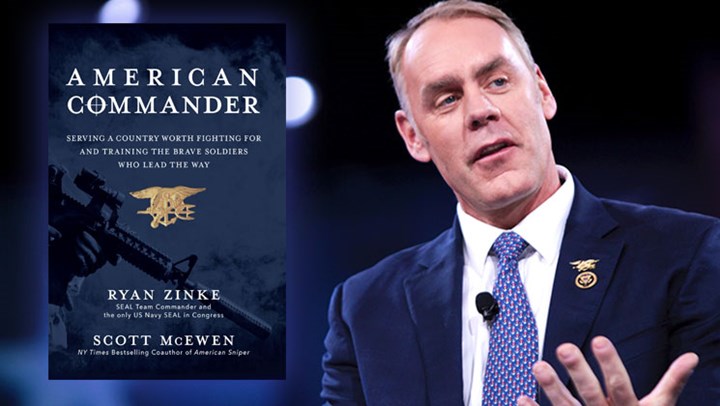
by Frank Miniter - Thursday, June 29, 2017

Our new Secretary of the Interior, Ryan Zinke, flamboyantly, and in rural Montana fashion, showcased his personality when he rode a horse down the streets of Washington, D.C., to his first day at his new job. Zinke left Congress to run an agency that oversees about three quarters of the lands managed by the federal government—over 500 million acres, or about one-fifth of the land in the United States.
Zinke is a Montana native and the first Navy SEAL commander to serve in Congress. During his 23 years as a SEAL, Zinke was commander of the country’s most elite SEAL Team, acting commander of Special Forces in Iraq and was awarded two bronze stars. He holds a degree in geology, an MBA in finance and a master’s degree in global leadership.
Given his incredible resume, there can be no doubt Zinke is a proven leader who knows how to accomplish a mission, but given that his policies are and will affect hunting and land-access issues on millions of acres of public lands, it is worth asking how his experience will impact our sports and our wildlife.
Zinke’s recent book American Commander (published a few months before President Donald Trump offered him the cabinet position he now occupies) offers a straightforward assessment of how he sees the federal role in local land and game management.
In the book Zinke writes:
This honest, on-the-ground view of bureaucracy must be humbling to bureaucrats who would like to govern from afar.
Zinke says as much:
That is why moving decisions down to people who have relevant, ground-level data and experience makes sense. It’s entirely possible that there are man-made reasons for the sage grouse’s population drop—if there has been a population drop at all, of course. But the people most likely to have that data and experience are those who live and work where the sage grouse are, not those who go to work on the Interstate 395 in D.C. The view from the Potomac is a lot different than the view from Yellowstone or the Missouri, so why does Washington think they are the same? It goes back to the same theme: Washington bureaucrats think they know how to manage nearly every aspect of our lives better than we do. But whether it’s our health-care system, our banking system, our water, or even a little bird on a prairie, Washington has it all wrong.
In his first months on the job we can see Zinke applying this philosophy to the Interior’s management of our public resources. For example, Zinke recently said this about opening ATV access to a public property: “Recreation on public lands is a big part of what we do at the Interior Department and the BLM, but for many persons with disabilities or for people who just don't get around like they used to, our public lands aren't accessible without motorized vehicles. Allowing ATVs and other vehicles in Recapture Canyon will open up opportunities for people to enjoy our public lands while still protecting the cultural and natural resources that make the place special. On my first day in office I prioritized public lands access. I’m happy to continue that mission.”
Given that the Department of the Interior has often been humorously referred to as “The Department of Everything Else,” Zinke’s philosophy will impact a huge percentage of our public lands and how we are able to use them. This makes Zinke an important figure in the Trump administration and to America’s hunters. It’s impossible to predict how much impact his governing philosophy will have, but it is worth understanding his core beliefs.
With regard to federal versus local control, he summed up his views in his book this way: “So I say, keep the centralized oversight for concerns that are truly nationwide, but allow for greater flexibility for issues that are better managed by the states or at the local level. If the Washington bureaucrats would listen, they might even discover that the answers to better management are not found within the beltway.”
■ ■ ■
Editor's Note: Frank Miniter is the author of "This Will Make a Man of You: One Man’s Search for Hemingway and Manhood in a Changing World." Miniter is also the author of the New York Times' Bestseller "The Ultimate Man’s Survival Guide," as well as "The Future of the Gun" and “The Politically Incorrect Guide to Hunting.”
E-mail your comments/questions about this site to:
[email protected]
Proudly supported by The NRA Foundation and Friends of NRA fundraising.
